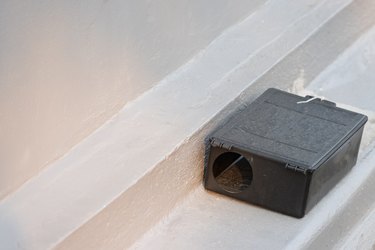
Rats are one of the most hated pests in the world. Not only are they frightening, but they're also unsanitary and can cause damage to your home. Getting rid of rats can be tricky, though, as they can fit through very small spaces and they are highly adaptable.
There are several methods for dealing with a rat infestation, including setting traps and even getting a cat. If you prefer a natural, non-killing approach, you might consider compounds or products that are believed (or advertised) to repel rats. While there are a few odors that have been shown to bother or even repel rats, application of these odors by itself is generally ineffective at keeping rats out of a house or garage. They can, however, keep rats from very specific areas, such as a corner where rats return to to nest.
Video of the Day
Video of the Day
Plant Oils to Repel Rats
The only plant oils approved by the Environmental Protection Agency to repel rodents are balsam fir (Abies balsamea) and thyme oil (Thymol). These oils can be applied around the places where you think rats may be entering your home to prevent them from doing so.
There are also some word-of-mouth accounts that peppermint oil is an effective rat repellent. It's easy to see why peppermint oil would be a popular choice, as it's affordable, accessible, safe and smells good (to humans at least). Although there's no scientific evidence supporting peppermint oil as an effective rat repellent, it may be worth a try. You can also plant certain types of herbs and plants, like peppermint (Mentha x piperita, USDA zones 5-9), around your garden or in pots in your home for a longer-lasting minty aroma.
Treating Infestations With Ammonia
Ammonia is also sometimes cited as a smell that repels rats. This is because ammonia is a primary constituent of urine. If a rat smells what it perceives as urine in an area, it may behave as if it's a different animal's territory and move on. For the same reason, used cat litter may work as a rat repellent.
The problems with these approaches are clear. Open containers of ammonia are not safe to leave around the home, while used cat litter is a smell that may be as repellent to humans as it is to rats. Sprinkling used cat litter around the borders of your garden may be a less repulsive way to try this method.
The other problem is that rats are smart. They may initially be put off by the potential threat of another animal, but once experience shows them that the threat isn't real, they may ignore the scent and return to the area anyway.
Mothballs and Commercial Rat Repellents
You may find some information online encouraging the use of mothballs to repel rats. While there seems to be anecdotal evidence that rats dislike the smell of mothballs, they're usually not safe to be used in this way. The active ingredients in mothballs, usually paradichlorobenzene or naphthalene, build up in airtight containers to kill moths and their eggs. However, if left out to repel rats, the gases dissipate quickly into the air. This means they're not only potentially harmful to humans but their efficacy in terms of repelling rats will be short-lived at best.
The safest, most effective rat repellent is a commercial product designed specifically for this use. These products are safe for humans, pets and the environment and are likely to be more effective than any homemade rat repellent.
- AAAnimal Control: How to Get Rid of Rats
- Terminix: Top Odors That Prevent Rat Infestations
- deBugged: What Smells Do Rats Hate?
- U.S. Environmental Protection Agency: Thymol
- National Pesticide Information Center: Can I Use Mothballs to Repel Insects or Animals?
- U.S. Environmental Protection Agency: Balsam Fir Oil 129035
- Missouri Botanical Garden: Mentha × piperita